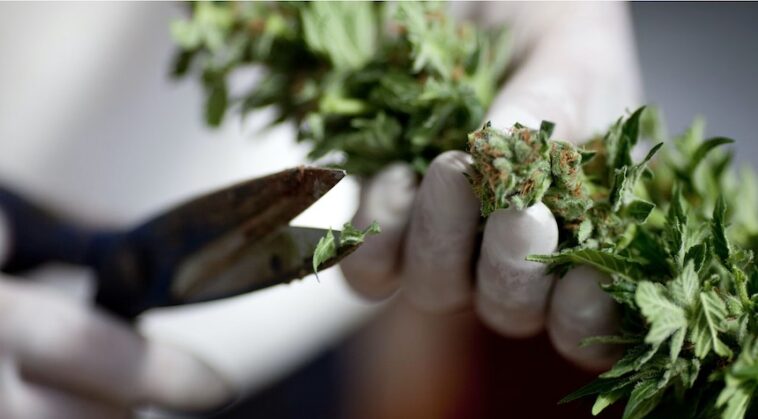Five Texas cities could join the growing number of states that have adopted workarounds for the Lone Star State’s prohibition of marijuana. This is the latest in a growing trend of decriminalizing marijuana.
Voters in Elgin and Harker Heights, Killeen, and San Marcos will all decide on November ballot propositions for legalizing marijuana. Austin, the capital of Texas, approved in May a measure decriminalizing marijuana. It prohibits citations and arrests for misdemeanor cannabis possession and bans no-knock warrants.
The five propositions being considered by the cities share the same language and titles: “[Insert city here] Freedom Act 2022.” This is because they were created by Ground Game Texas, an Austin-based progressive non-profit. Ground Game Texas supports legalizing marijuana and advocates for a $15 minimum salary and expanded Medicaid. Ground Game Texas is also behind Austin’s marijuana legalization and no-knock ban. This was called the “Austin Freedom Act of 2021”.
The cookie-cutter proposal language would allow each city to prohibit the citation and arrest of misdemeanor possession of cannabis, except when the investigation was a felony or violent felony. The police may not use the smell or taste of marijuana to justify a search or seizure. They may not also use city funds or personnel for THC concentration testing.
These five cities make up the southwest trail that runs from Denton to San Marcos. They will join El Paso and Cedar Park as they decriminalize marijuana.
Ground Game Texas, in addition to helping coordinate marijuana decriminalization efforts, is calling for a “San Antonio Justice Charter” that would not only decriminalize marijuana but also allow abortion. The charter would implement progressive policies reminiscent of California, including the hiring of a social justice director similar to a mayor, banning no-knock warrants or police chokeholds, citation-only penalties for class C misdemeanors like drug possession, theft, property or service less than $750, driving without an invalid license, contraband possession in prison, graffiti with damages below $2,500, and criminal mischief resulting in damages of less than $750. To make the May municipal ballot, they need to have 20,000 verified signatures.
Ground Game Texas also advocates for a $15 minimum wage in Edinburg and a climate change policy for El Paso.
As more research is being done on the possible connection between marijuana use and mental illness, mass marijuana decriminalization efforts have been accelerated.
This decriminalization push is supported by some of Texas’ Republican leaders. According to comments made by the Texas Tribune during a campaign stop, Governor Greg Abbott indicated a more relaxed stance on marijuana criminalization in January.
Abbott stated, “One thing I believe in, I believe the state legislature believes it in, is prison and jail. It is a place where dangerous criminals may harm others.” “Small possession is not a violation we want to stockpile with jails.”
Sid Miller, Texas Agriculture Commissioner, claimed that marijuana is medically beneficial and that banning it was racist, classist, and authoritarian.
Miller wrote that in a free society, the government should make cannabis illegal only for a compelling reason or set facts. As I reflect back, I see that the fear behind cannabis prohibition was not based on medical science or analysis of social harm. Unfortunately, this prohibition was rooted in a history of racism and classism as well as a central government that wanted to dominate others. It has anti-American origins that are as far as can be imagined.
Miller and Abbott are two examples of Republicans who have resigned from disapproval of marijuana by joining a decriminalization drive that resonates deep within the Democratic Party, all the way to Trump’s White House. The Democrats who are at the forefront of voters’ minds in the run-up to the November election, like Pennsylvania Lieutenant Governor John Fetterman and Senate candidate John Miller, support decriminalization. However, they view this issue as only the tip of the iceberg. Fetterman has always advocated for the decriminalization of hard drugs.
This month, President Joe Biden granted a mass pardon to all those convicted for simple marijuana possession. Experts and The Heritage Foundation warned that the vast majority of criminal convictions stemmed from plea agreements. Biden’s pardon means that those who received it likely committed more serious crimes than marijuana possession. Paul Larkin is a senior legal researcher at Heritage Foundation and told The Daily Wire that plea deals are almost always made.
Larkin stated that 95% of federal prosecutors engage in plea bargaining. Is it possible that people who aren’t guilty of a more serious offense will be able to get a benefit from this? It’s true.
The post Five Texas Cities May Decriminalize Marijuana in Workaround to State Ban appeared first on Conservative Research Group.


